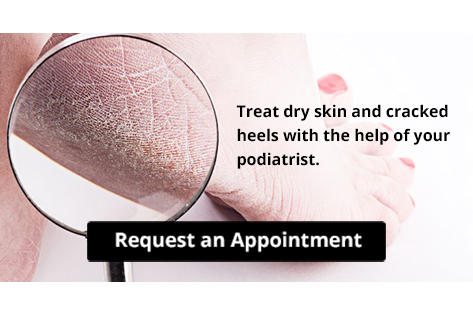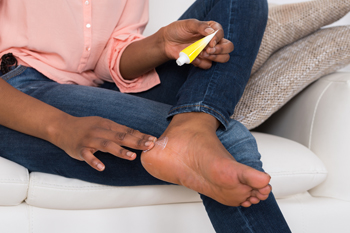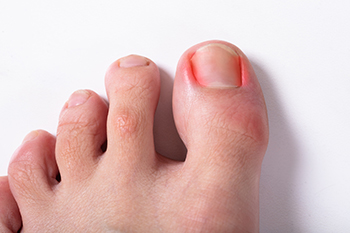Connect With Us
Blog
Items filtered by date: November 2021
Is Standing All Day Bad?
You may have once heard that it is better to stand than sit, however, this may not be entirely accurate. While it might be true that sitting too much can have ill effects on your overall health, standing all day is also not great. Standing for prolonged periods of time has been linked to muscle strain, fatigue, swelling, varicose veins, leg cramps, joint problems, plantar fasciitis, bunions, calluses, and corns. If you must stand for long periods of time, it is suggested that you frequently change the position you stand in, wear comfortable and supportive shoes, walk around and stretch your feet, and take occasional breaks to sit and rest. If you are suffering from foot pain, please seek the care of a podiatrist.
While working on the feet, it is important to take the proper care of them. For more information about working on your feet, contact one of our podiatrists from Comprehensive Foot & Ankle Centers. Our doctors will treat your foot and ankle needs.
Working on Your Feet
Standing on your feet for long periods of time can cause stress and pain in your feet. Your whole body may experience change in terms of posture, back pain, bunions, callouses and or plantar warts. There are ways to avoid these conditions with proper foot care, smart choices and correct posture.
Positive Changes
Negative heeled shoe – Choosing this shoe type places the heel slightly lower than the ball of the foot. These are great for overall foot health. Find shoes that fit you correctly.
Go barefoot – Our feet were not designed to be enclosed for all hours of the day. Try to periodically expose your feet to air.
Eliminate Pain
Foot Exercises – Performing simple exercises, incorporating yoga and doing stretches are beneficial. This will allow increased blood flow to the area and muscles of the foot.
Achilles tendon – Stretching the foot out flat on the floor will relax the calf muscles and tendon. These exercises can be performed almost anywhere. Make sure you add these exercises to your daily regimen.
With a little bit of this information and knowing more about foot health, you will notice changes. Foot stretches and proper footwear will help with pain and prevent further issues.
If you have any questions please feel free to contact our offices located in Shepherdsville and Louisville, KY . We offer the newest diagnostic and treatment technologies for all your foot and ankle needs.
Treat Cracked Heels This Fall With the Help of Your Podiatrist
High Heels Can Be Harmful
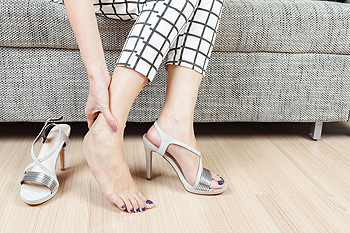 Most little girls can’t wait for the day that they are able to wear high-heeled shoes. And while high heels often look attractive, down the road, they can eventually cause painful foot conditions. Aside from the obvious possibilities of falling or spraining an ankle, wearing high heels for extended periods of time can also lead to lower back and knee pain. If 5-inch heels are causing a problem, rather than switching to flats, a middle-of-the-road approach is suggested. Flat shoes can cause the Achilles tendon to become inflamed, and this may hurt the back of the heel. Wearing lower heels somewhere between 1 and 2 inches can help alleviate symptoms as well as a wider toe box. If your feet hurt, whether you wear high heels or not, it is a good idea to consult a podiatrist for an evaluation and treatment plan.
Most little girls can’t wait for the day that they are able to wear high-heeled shoes. And while high heels often look attractive, down the road, they can eventually cause painful foot conditions. Aside from the obvious possibilities of falling or spraining an ankle, wearing high heels for extended periods of time can also lead to lower back and knee pain. If 5-inch heels are causing a problem, rather than switching to flats, a middle-of-the-road approach is suggested. Flat shoes can cause the Achilles tendon to become inflamed, and this may hurt the back of the heel. Wearing lower heels somewhere between 1 and 2 inches can help alleviate symptoms as well as a wider toe box. If your feet hurt, whether you wear high heels or not, it is a good idea to consult a podiatrist for an evaluation and treatment plan.
High heels have a history of causing foot and ankle problems. If you have any concerns about your feet or ankles, contact one of our podiatrists from Comprehensive Foot & Ankle Centers. Our doctors can provide the care you need to keep you pain-free and on your feet.
Effects of High Heels on the Feet
High heels are popular shoes among women because of their many styles and societal appeal. Despite this, high heels can still cause many health problems if worn too frequently.
Which Parts of My Body Will Be Affected by High Heels?
- Ankle Joints
- Achilles Tendon – May shorten and stiffen with prolonged wear
- Balls of the Feet
- Knees – Heels cause the knees to bend constantly, creating stress on them
- Back – They decrease the spine’s ability to absorb shock, which may lead to back pain. The vertebrae of the lower back may compress.
What Kinds of Foot Problems Can Develop from Wearing High Heels?
- Corns
- Calluses
- Hammertoe
- Bunions
- Morton’s Neuroma
- Plantar Fasciitis
How Can I Still Wear High Heels and Maintain Foot Health?
If you want to wear high heeled shoes, make sure that you are not wearing them every day, as this will help prevent long term physical problems. Try wearing thicker heels as opposed to stilettos to distribute weight more evenly across the feet. Always make sure you are wearing the proper shoes for the right occasion, such as sneakers for exercising. If you walk to work, try carrying your heels with you and changing into them once you arrive at work. Adding inserts to your heels can help cushion your feet and absorb shock. Full foot inserts or metatarsal pads are available.
If you have any questions please feel free to contact our offices located in Shepherdsville and Louisville, KY . We offer the newest diagnostic and treatment technologies for all your foot and ankle needs.
Getting to the Bottom of Cracked Heels
When you have dry, thickened, callused skin around the edges of your heels, they can crack due to the fat pad under your heels expanding while you walk. There are several factors that can cause dry, cracked heels or exacerbate the problem. These include standing for prolonged periods of time, wearing shoes with open backs or walking around barefoot, taking long, hot showers, using harsh soaps, and living in a cold or dry climate. Certain medical conditions, such as a fungal infection, psoriasis, or a vitamin deficiency, can also cause cracked heels. While cracked heels are typically not painful, those who have particularly deep cracks may experience pain and bleeding, and people with underlying health conditions, like diabetes, should always be monitoring the health of their heels. To learn more about cracked heels and to help find the right treatment for yours, please consult with a podiatrist.
Cracked heels are unsightly and can cause further damage to your shoes and feet. If you have any concerns, contact one of our podiatrists from Comprehensive Foot & Ankle Centers. Our doctors can provide the care you need to keep you pain-free and on your feet.
Cracked Heels
Cracked heels appear unappealing and can make it harder for you walk around in sandals. Aside from looking unpleasant, cracked heels can also tear stockings, socks, and wear out your shoes. There are several methods to help restore a cracked heel and prevent further damage.
How Do You Get Them?
Dry skin is the number one culprit in creating cracked heels. Many athletes, walkers, joggers, and even swimmers suffer from cracked heels. Age and skin oil production play a role to getting cracked heels as well.
Promote Healing
Over the counter medicines can help, especially for those that need instant relief or who suffer from chronic dry feet.
Wear Socks – Wearing socks with medicated creams helps lock in moisture.
Moisturizers – Applying both day and night will help alleviate dryness which causes cracking.
Pumice Stones – These exfoliate and remove dead skin, which allows for smoother moisturizer application and better absorption into the skin.
Change in Diet
Eating healthy with a well-balanced diet will give the skin a fresh and radiant look. Your body responds to the kinds of food you ingest. Omega-3 fatty acids and zinc supplements can also revitalize skin tissue.
Most importantly, seek professional help if unsure how to proceed in treating cracked heels. A podiatrist will help you with any questions or information needed.
If you have any questions, please feel free to contact our offices located in Shepherdsville and Louisville, KY . We offer the newest diagnostic and treatment technologies for all your foot care needs.
Preventing Fungal Toenail Infections
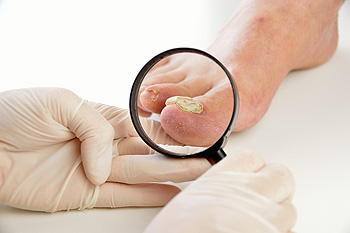 Fungal toenail infections are a common problem that can cause your toenails to become yellowed, crumble, thicken and potentially separate from the nail bed. The fungi that usually cause toenail infections often thrive in warm, moist environments. They can enter the nail through tiny cracks and begin to grow underneath it. Thankfully, a few measures can be taken to prevent this from happening. Make sure your feet are always properly dried, your toenails are kept short, and your socks are clean. It is also important to use your own footwear in public pools and showers, and use an antifungal spray for your shoes. If you do get a toenail infection, please consult a podiatrist for treatment.
Fungal toenail infections are a common problem that can cause your toenails to become yellowed, crumble, thicken and potentially separate from the nail bed. The fungi that usually cause toenail infections often thrive in warm, moist environments. They can enter the nail through tiny cracks and begin to grow underneath it. Thankfully, a few measures can be taken to prevent this from happening. Make sure your feet are always properly dried, your toenails are kept short, and your socks are clean. It is also important to use your own footwear in public pools and showers, and use an antifungal spray for your shoes. If you do get a toenail infection, please consult a podiatrist for treatment.
For more information about treatment, contact one of our podiatrists of Comprehensive Foot & Ankle Centers. Our doctors can provide the care you need to keep you pain-free and on your feet.
Toenail Fungus Treatment
Toenail fungus is a condition that affects many people and can be especially hard to get rid of. Fortunately, there are several methods to go about treating and avoiding it.
Antifungals & Deterrence
Oral antifungal medicine has been shown to be effective in many cases. It is important to consult with a podiatrist to determine the proper regiment for you, or potentially explore other options.
Applying foot powder on the feet and shoes helps keep the feet free of moisture and sweat.
Sandals or open toed shoes – Wearing these will allow air movement and help keep feet dry. They also expose your feet to light, which fungus cannot tolerate. Socks with moisture wicking material also help as well.
If you have any questions please feel free to contact our offices located in Shepherdsville and Louisville, KY . We offer the newest diagnostic tools and technology to treat your foot and ankle needs.
When Ingrown Toenails Become More Than a Minor Nuisance
The severity of an ingrown toenail can range from mild and slightly uncomfortable to severe and even dangerous for certain people. When an ingrown toenail grows deep into the surrounding skin or breaks it, a medical intervention may be necessary to provide relief and help avoid further complications from developing. People with systemic health issues such as diabetes, poor circulation or nerve damage are particularly at risk of developing complications from an untreated ingrown toenail. Since these complications make it harder to detect, feel and heal decayed or damaged tissues in the skin, the condition may worsen and lead to a local infection, a foot ulcer, or even a bone infection. Prevention, early detection, and proper treatment will help keep ingrown toenails from developing and worsening, and podiatrists are experts in all of these areas. Call your local podiatrist for more information on treatment.
Ingrown toenails can become painful if they are not treated properly. For more information about ingrown toenails, contact one of our podiatrists of Comprehensive Foot & Ankle Centers. Our doctors can provide the care you need to keep you pain-free and on your feet.
Ingrown Toenails
Ingrown toenails occur when a toenail grows sideways into the bed of the nail, causing pain, swelling, and possibly infection.
Causes
- Bacterial infections
- Improper nail cutting such as cutting it too short or not straight across
- Trauma to the toe, such as stubbing, which causes the nail to grow back irregularly
- Ill-fitting shoes that bunch the toes too close together
- Genetic predisposition
Prevention
Because ingrown toenails are not something found outside of shoe-wearing cultures, going barefoot as often as possible will decrease the likeliness of developing ingrown toenails. Wearing proper fitting shoes and using proper cutting techniques will also help decrease your risk of developing ingrown toenails.
Treatment
Ingrown toenails are a very treatable foot condition. In minor cases, soaking the affected area in salt or antibacterial soaps will not only help with the ingrown nail itself, but also help prevent any infections from occurring. In more severe cases, surgery is an option. In either case, speaking to your podiatrist about this condition will help you get a better understanding of specific treatment options that are right for you.
If you have any questions please feel free to contact our offices located in Shepherdsville and Louisville, KY . We offer the newest diagnostic and treatment technologies for all your foot and ankle needs.
Blog Archives
- July 2025
- June 2025
- May 2025
- April 2025
- March 2025
- February 2025
- January 2025
- December 2024
- November 2024
- October 2024
- September 2024
- August 2024
- July 2024
- June 2024
- May 2024
- April 2024
- March 2024
- February 2024
- January 2024
- December 2023
- November 2023
- October 2023
- September 2023
- August 2023
- July 2023
- June 2023
- May 2023
- April 2023
- March 2023
- February 2023
- January 2023
- December 2022
- November 2022
- October 2022
- September 2022
- August 2022
- July 2022
- June 2022
- May 2022
- April 2022
- March 2022
- February 2022
- January 2022
- December 2021
- November 2021
- October 2021
- September 2021
- August 2021
- July 2021
- June 2021
- May 2021
- April 2021
- February 2021
- January 2021
- December 2020

